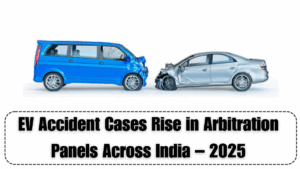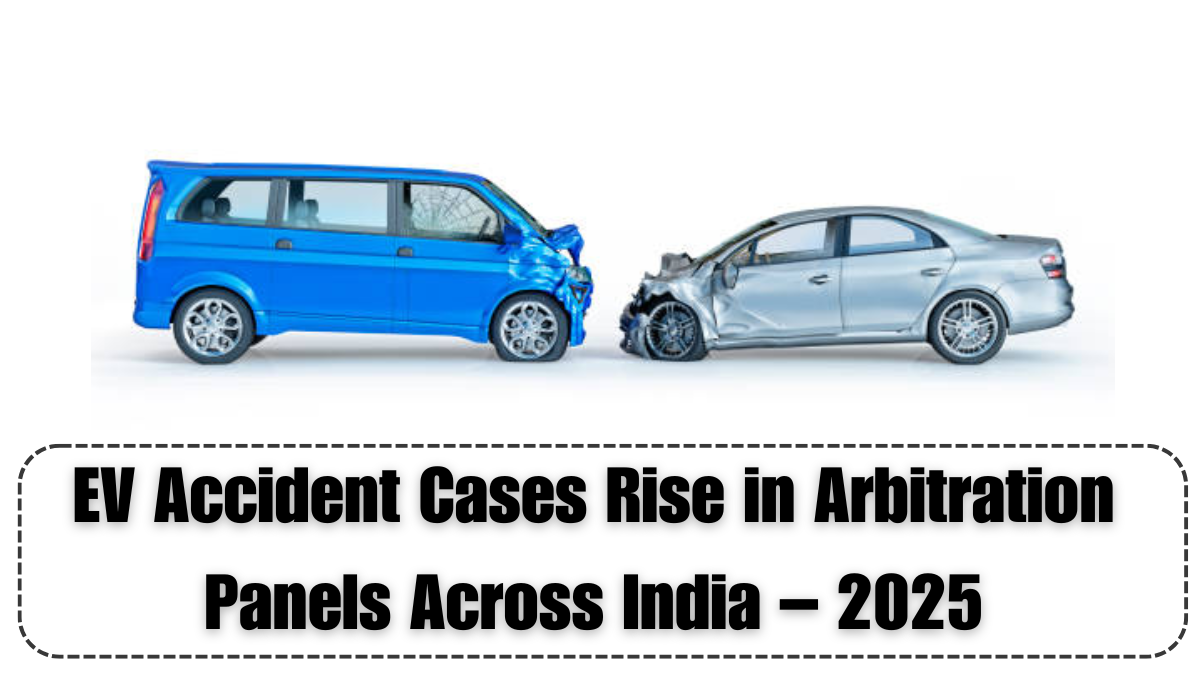In 2025, India’s rapidly expanding electric vehicle market has witnessed an unexpected spike in EV accident arbitration cases. With millions of new EVs on Indian roads, legal disputes around EV-specific crashes, battery fires, charging station incidents, and software malfunctions are on the rise. Arbitration panels across major Indian cities like Delhi, Mumbai, Hyderabad, and Bengaluru are now handling dozens of India auto cases every week involving electric vehicles.
Unlike traditional ICE (internal combustion engine) vehicles, EVs present unique challenges—such as regenerative braking, software-led driving controls, and battery-related risks—which often create grey areas in legal liability. As a result, dispute resolution is becoming a key part of the EV ownership ecosystem.

The Legal Surge in EV Accident Disputes
According to recent reports from state consumer commissions and arbitration panels, more than 2,000 EV accident arbitration cases have been filed in 2025 alone. These range from personal injury claims to dealership liability cases and faulty repair disputes. Key reasons behind this legal uptick include:
-
Malfunctions in automated braking or steering systems
-
Sudden battery overheating leading to smoke or fire
-
Inadequate roadside EV charging infrastructure causing traffic risks
-
Insufficient driver training on EV behavior and performance
Lawyers and mediators familiar with EV law now play a crucial role in helping both individuals and auto firms settle matters fairly.
Arbitration vs Court Battles: Why EV Cases Prefer Panels
Arbitration is becoming the preferred route in India auto cases involving EVs due to the technical complexity and faster resolution it offers. Unlike conventional court litigation, arbitration allows:
-
Use of EV technical experts as witnesses
-
Case completion within 60–90 days
-
Flexible interpretation of warranty and service terms
-
Private, non-adversarial settlement environment
EV manufacturers, insurers, and consumers are encouraged by legal advisors to resolve matters through dispute resolution frameworks rather than lengthy court battles.
Real Cases Filed Under Arbitration in 2025
A few high-profile EV accident arbitration cases are now serving as precedents for similar disputes:
| Case | Location | Dispute Type | Resolution Summary |
|---|---|---|---|
| Sharma v. EVX Motors | Pune | Sudden brake failure | ₹2.5 lakh compensation + vehicle replacement |
| Meena Singh v. EVChargeCo | Noida | Charging station fire injury | ₹1.8 lakh damages, EV charger audit ordered |
| Bhaskar Group v. Fleet EV Ltd | Hyderabad | Software-led collision of fleet vehicle | Technical recall and policy overhaul by Fleet EV Ltd |
These examples highlight how arbitration is becoming a key legal tool in the EV law landscape.
How EV Law Is Evolving in India
To keep up with the pace of electric mobility, legal frameworks are being updated to address EV-specific concerns. Notable changes include:
-
Mandated EV insurance add-ons for software failures
-
Inclusion of charging station safety audits under Motor Vehicles Act
-
Formal inclusion of EV accident arbitration cases in State Legal Services Authority procedures
-
Special EV mediation wings in urban arbitration centers
Law schools and legal institutes are now offering specialized modules in India auto cases involving EVs, including mock arbitration practices.
Why This Legal Shift Matters for Consumers
Electric vehicle buyers today must be aware of the legal support available in case of a malfunction, accident, or repair conflict. With dispute resolution now integrated into many EV purchase contracts, buyers are protected more than ever.
If you’re an EV owner in India, here’s what you should do to stay safe legally:
-
Always record driving incidents on your dashcam
-
Register your EV service history digitally
-
Keep your charging log and battery health reports
-
Consult EV-specialized legal advisors when needed
-
Know your arbitration rights before signing dealership papers
FAQs
What are EV accident arbitration cases?
They are legal disputes related to electric vehicle accidents or malfunctions that are settled through arbitration instead of traditional courts.
Why are these cases increasing in India?
The rise in EV adoption, combined with unique risks like battery fires and software errors, has led to more India auto cases requiring arbitration.
How is EV law different from regular vehicle law?
EV law includes additional considerations such as battery warranty, software control issues, and charging safety, which are not common in regular vehicles.
Is arbitration faster than going to court?
Yes. Arbitration usually resolves dispute resolution cases within 2–3 months and is less expensive than full court litigation.
Can consumers win arbitration cases against big EV companies?
Yes. Many EV owners have received compensation or free replacements through arbitration panels if the claim is justified.
Click here to know more.
